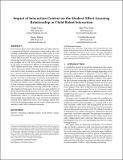| dc.contributor.author | Chen, Huili | |
| dc.contributor.author | Park, Hae Won | |
| dc.contributor.author | Zhang, Xiajie | |
| dc.contributor.author | Breazeal, Cynthia | |
| dc.date.accessioned | 2021-11-02T17:33:38Z | |
| dc.date.available | 2021-11-02T17:33:38Z | |
| dc.date.issued | 2020 | |
| dc.identifier.uri | https://hdl.handle.net/1721.1/137135 | |
| dc.description.abstract | © 2020 Association for Computing Machinery. Prior work in affect-aware educational robots has often relied on a common belief that the relationship between student affect and learning is independent of agent behaviors (child's/robot's) or unidirectional (positive/negative but not both) throughout the entire student-robot interaction.We argue that the student affect-learning relationship should be interpreted in two contexts: (1) social learning paradigm and (2) sub-events within child-robot interaction. In our paper, we examine two different social learning paradigms where children interact with a robot that acts either as a tutor or a tutee. Sub-events within child-robot interaction are defined as task-related events occurring in specific phases of an interaction (e.g., when the child/robot gets a wrong answer). We examine subevents at a macro level (entire interaction) and a micro level (within specific sub-events). In this paper, we provide an in-depth correlation analysis of children's facial affect and vocabulary learning. We found that children's affective displays became more predictive of their vocabulary learning when children interacted with a tutee robot who did not scaffold their learning. Additionally, children's affect displayed during micro-level events was more predictive of their learning than during macro-level events. Last, we found that the affect-learning relationship is not unidirectional, but rather is modulated by context, i.e., several affective states facilitated student learning when displayed in some sub-events but inhibited learning when displayed in others. These findings indicate that both social learning paradigm and sub-events within interaction modulate student affect-learning relationship. | en_US |
| dc.language.iso | en | |
| dc.publisher | ACM | en_US |
| dc.relation.isversionof | 10.1145/3319502.3374822 | en_US |
| dc.rights | Creative Commons Attribution-Noncommercial-Share Alike | en_US |
| dc.rights.uri | http://creativecommons.org/licenses/by-nc-sa/4.0/ | en_US |
| dc.source | MIT web domain | en_US |
| dc.title | Impact of Interaction Context on the Student Affect-Learning Relationship in Child-Robot Interaction | en_US |
| dc.type | Article | en_US |
| dc.identifier.citation | Chen, Huili, Park, Hae Won, Zhang, Xiajie and Breazeal, Cynthia. 2020. "Impact of Interaction Context on the Student Affect-Learning Relationship in Child-Robot Interaction." ACM/IEEE International Conference on Human-Robot Interaction. | |
| dc.contributor.department | Massachusetts Institute of Technology. Media Laboratory | |
| dc.relation.journal | ACM/IEEE International Conference on Human-Robot Interaction | en_US |
| dc.eprint.version | Author's final manuscript | en_US |
| dc.type.uri | http://purl.org/eprint/type/ConferencePaper | en_US |
| eprint.status | http://purl.org/eprint/status/NonPeerReviewed | en_US |
| dc.date.updated | 2021-06-24T15:32:09Z | |
| dspace.orderedauthors | Chen, H; Park, HW; Zhang, X; Breazeal, C | en_US |
| dspace.date.submission | 2021-06-24T15:32:11Z | |
| mit.license | OPEN_ACCESS_POLICY | |
| mit.metadata.status | Authority Work and Publication Information Needed | en_US |
